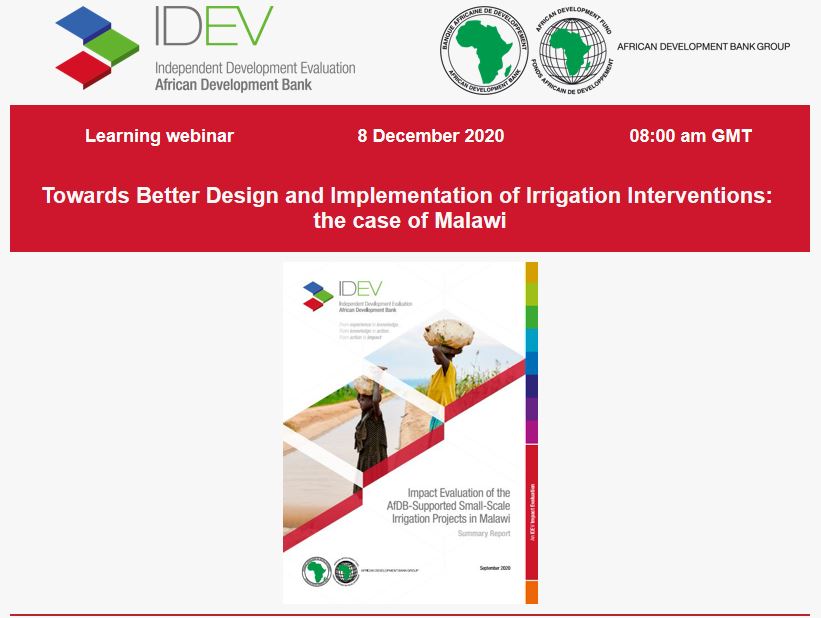
Following a first learning webinar organized for AfDB staff in October to discuss the outcomes of IDEV’s recent impact evaluation of irrigation schemes, a second webinar was held on 8 December 2020 for Malawi Government officials. It gathered over 40 attendees from different ministries and departments, based in different regions of the country.
In her opening remarks, Eyerusalem Fasika, Acting Country Manager of the AfDB Malawi Office, made a quick recap of the purpose and scope of the irrigation projects that were assessed. She emphasized that this evaluation would not have been successful without the kind support from the Government of Malawi, especially the Ministry of Finance, the Ministry of Agriculture, Irrigation, and Water Development, and Ministry of Forestry and Natural Resources.
Moses Chirwa, Deputy Director at the Ministry of Finance, added that moving forward, it will be important to further look into the issue of irrigation because the country cannot rely on rain-fed agriculture.
During the two-hour discussion session, the following presentations were made:
- "Lessons learned from the Malawi impact evaluation and other agricultural water management projects: How do we do things better?" presented by Girma Earo Kumbi, Chief Evaluation Officer, IDEV.2;
- “Systematic integration of knowledge from IDEV’s evaluations into the design and implementation of Bank irrigation interventions: What we have done; What we are doing; What we plan to do", by Vinda Kisyombe, Senior Agricultural Economist, RDGS.2; and
- “Towards better irrigation infrastructure and effective farmers’ schemes: What works? What doesn’t and why? An agro-processing and marketing perspective; and an institutional perspective", presented by Chukwuma Ikechukwu Ezedinma, Principal Agricultural Economist, Rural Infrastructure Development, AHFR.2
During the Q&A session, the participating government officials shared their views and experiences; their interventions were enriching and insightful. One participant from the Ministry of Agriculture, Irrigation, and Water Development commented that there have been a number of instances where the costs of irrigation projects have been underestimated, thus the importance for all stakeholders to gather and brainstorm as realistically as possible in order to take on board what the market demands are. He also encouraged to take adequate time for project preparation (feasibility and technical studies). Another participant said that in most irrigation projects, there is just a short period of capacity building within the project implementation period for farmers. Farming is being transformed from subsistence to commercial but the time allocated is not adequate to build farmers’ capacities.
The Malawian Government intends to apply the lessons from the evaluation. To address flaws in project design, it has strengthened its capacity to undertake better review of designs, by various ministries working together with local authorities. It is applying higher standards of work and greater quality assurance. A taskforce composed of different departments is examining the issue of unutilized infrastructure in all irrigation schemes.
In her closing remarks, Karen Rot-Munstermann, IDEV’s Acting Evaluator General, said that for future intervention projects (including irrigation) to succeed, addressing issues such as capacity building, governance, access to finance, access to markets, social dimensions, utilized and non-utilized infrastructures, as well as project preparation, project design, quality assurance, maintenance and sustainability are critical.
The other event materials can be downloaded below.
Presentation Chukwuma: Maximizing the benefits of irrigation projects
Presentation Girma: Impact Evaluation Malawi irrigation - Key findings and lessons
Presentation Kisyombe: Bank’s Support to Irrigation Investment projects in Malawi
Poster: Impact Evaluation of Irrigation Development in Malawi

